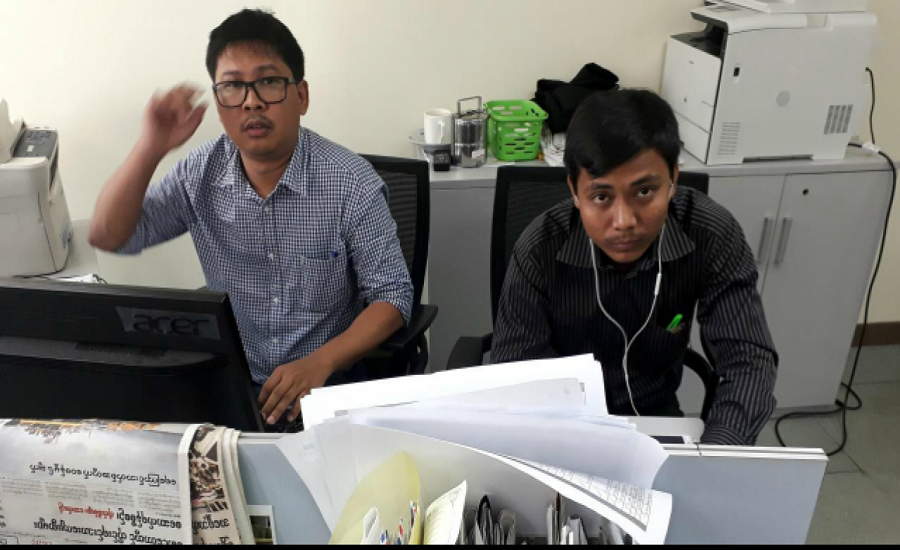
We will not wait while Wa Lone and Kyaw Soe Oo suffer this injustice and will evaluate how to proceed in the coming days, including whether to seek relief in an international forum, Reuters editor in chief Stephen J Adler said in a statement.
YANGON (Reuters) — A Myanmar judge on Monday found two Reuters journalists guilty of breaching a law on state secrets and sentenced them to seven years in prison, in a landmark case seen as a test of progress towards democracy in the Southeast Asian country.
Yangon northern district judge Ye Lwin said Wa Lone, 32, and Kyaw Soe Oo, 28, breached the colonial-era Official Secrets Act when they collected and obtained confidential documents.
“The defendants … have breached Official Secrets Act section 3.1.c, and are sentenced to seven years. The time already served by the defendants from Dec. 12 will be taken into consideration,” the judge said.
Press freedom advocates, the United Nations, the European Union and countries including the United States, Canada and Australia had called for the Reuters journalists’ acquittal.
“Today is a sad day for Myanmar, Reuters journalists Wa Lone and Kyaw Soe Oo, and the press everywhere,” Reuters editor in chief Stephen J Adler said in a statement.
“We will not wait while Wa Lone and Kyaw Soe Oo suffer this injustice and will evaluate how to proceed in the coming days, including whether to seek relief in an international forum.”
The reporters had told the court two police officials handed them papers at a north Yangon restaurant moments before other officers arrested them.
One police witness testified the restaurant meeting was a set-up to entrap the journalists to block or punish them for their reporting of a mass killing of Rohingya Muslims.
“I have no fear,” Wa Lone said after the verdict.
“I have not done anything wrong … I believe in justice, democracy and freedom.”
The verdict means Wa Lone and Kyaw Soe Oo – who both have young daughters and have not seen their families outside of prison visits and court hearings for nearly nine months – remain behind bars.
Kyaw Soe Oo has a three-year-old daughter and Wa Lone’s wife, Pan Ei Mon, gave birth to their first child last month.
Myanmar government spokesman Zaw Htay has mostly declined to comment throughout the proceedings, saying Myanmar’s courts were independent and the case would be conducted according to the law.
The verdict had been postponed for a week because Judge Ye Lwin was sick. It comes amid mounting pressure on the government of Nobel laureate Aung San Suu Kyi over a security crackdown sparked by attacks by insurgents from the Rohingya Muslim minority on the security forces in August 2017.

More than 700,000 stateless Rohingya Muslims fled across western Myanmar’s border with Bangladesh, according to U.N. agencies.
Dozens of reporters from domestic and international media organizations and diplomats were at the court for the verdict.
“Hammer blow”
U.S. ambassador Scot Marciel said he was sad for the two reporters and also for Myanmar.
“It’s deeply troubling for everybody who has struggled so hard here for media freedom. I think one has to ask will this process increase or decrease the confidence the people of Myanmar have in their justice system,” Marciel told reporters.
“We are disappointed by today’s court decision,” the U.N. Resident and Humanitarian Coordinator in Myanmar, Knut Ostby, said in a statement. “The United Nations has consistently called for the release of the Reuters journalists and urged the authorities to respect their right to pursue freedom of expression and information.”
British ambassador Dan Chugg, speaking on behalf of his government and EU members, said he was “extremely disappointed” by the verdict in a case that had “passed a long shadow” over freedom of expression and the rule of law.
“This has dealt a hammer blow for the rule of law,” Chugg said.
The Reuters reporters were arrested on Dec. 12 while investigating the killing of 10 Rohingya men and boys and other abuses involving soldiers and police in Inn Din, a village in Rakhine State.
Myanmar has denied allegations of atrocities made by refugees against its security forces, saying it conducted a legitimate counterinsurgency operation against Muslim militants.
But the military acknowledged the killing of the 10 Rohingya men and boys at Inn Din after arresting the Reuters reporters.
A U.N mandated fact-finding mission said last week Myanmar’s military carried out mass killings and gang rapes of Muslim Rohingya with “genocidal intent” and called for top generals to be prosecuted. Myanmar rejected the findings.
The International Criminal Court is considering whether it has jurisdiction over events in Rakhine, while the United States, the European Union and Canada have sanctioned Myanmar military and police officers over the crackdown.

